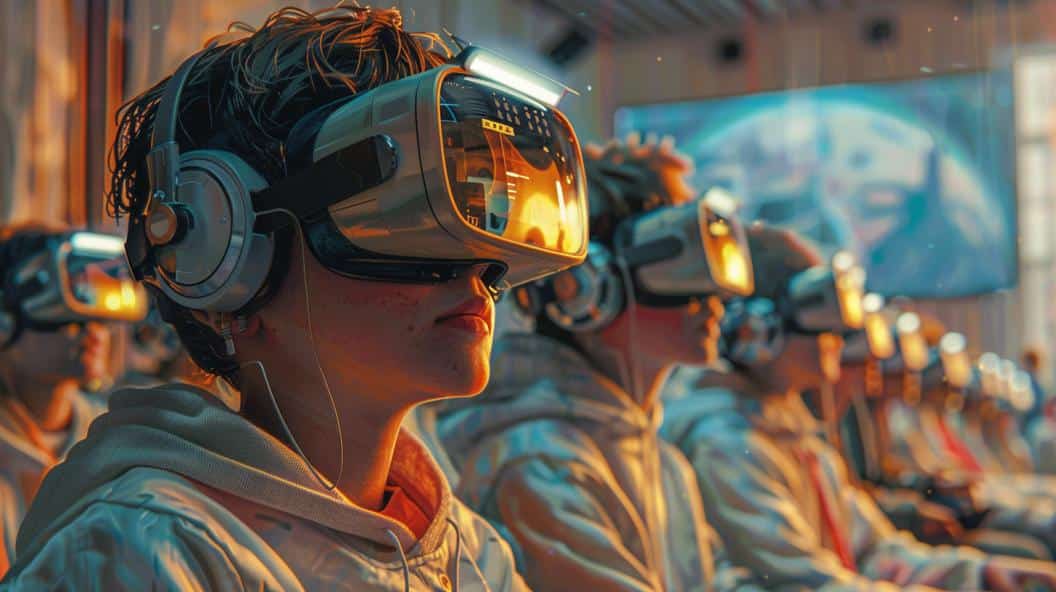Imagine a world where distance, physical reality and our own limitations transform into limitless possibilities. This is what virtual reality (VR) is starting to bring to life in our daily lives. With each passing day, we are stepping deeper into territory once reserved only for science fiction. In “The Future is Now: VR Changes the World,” we embark on an exploratory journey into the revolutionary impact of VR. From boundary-pushing social interactions to life-saving medical advances, VR is not only shaping but redefining our world. Light the flame of curiosity and join us on this immersive adventure that promises to expand your horizons.
What is the current impact of virtual reality on society?
Virtual reality (VR) is already a transformative power in today's society, reshaping areas from entertainment to the professional and healthcare sectors. VR delights and surprises, providing a sensorial escape from reality. Imagine putting on VR glasses and suddenly being immersed in a live concert, despite being in the comfort of your home.
How is VR being used to transform social interaction and everyday habits? From recreation to communication, VR is changing social patterns. VR games are particularly notable for providing unparalleled immersive experiences, with products such as Oculus Rift and HTC Vive selling millions of units. But the influence of VR technology on everyday life goes further. 360-degree films and documentaries draw viewers into the action, and virtual meetings enable intensely engaging remote collaborations while cutting business travel costs.
And what are the cultural and psychological barriers encountered in adopting VR? Yes, there are challenges. The rising price of quality devices and the need for powerful computers restrict access to this innovation. Adverse effects such as motion sickness caused by virtual movement are practical issues to be overcome. Furthermore, with increased use comes concern about social isolation and the preference for virtual reality over real-world experiences.
The integration of VR into our lives is an ongoing phenomenon, revealing a universe of possibilities that challenges the ethics and psychology of its use and development. In effect, VR calls us to consider how to balance the virtual world with the physical, ensuring advances that genuinely enrich the human experience.
How is virtual reality revolutionizing the gaming and entertainment industry?
The most impactful games and entertainment experiences in VR today are those that offer complete immersion and advanced interactivity, such as “Beat Saber”, “Half-Life: Alyx” and 360-degree cinematic experiences. These are examples where the border between the real and the virtual almost disappears, transporting users to rich and immersive worlds.
The next steps for VR in creating more immersive entertainment experiences include improving image quality, reducing latency, and enhancing haptic feedback so that users not only see an alternative environment, but also interact with it in a different way. more natural and intuitive way. Exploiting this technological evolution, creators are developing new ways to tell stories and engage players' senses, setting a new standard for the art of entertainment.
As we move forward, challenges such as the cost of equipment and the need for adequate spaces are barriers that the industry is working to overcome, promising to bring VR experiences to an even wider audience.
In which sectors is virtual reality generating significant transformations?
Virtual reality (VR) is revolutionizing medical practice by enabling simulations of surgical procedures, allowing healthcare professionals to train their skills in a controlled, risk-free environment for real patients. In medicine, VR is also used to treat psychological conditions, such as phobias and anxiety disorders, allowing patients to face their fears in a safe environment.
In the education sector, VR introduces a new level of immersive learning. Students can explore historical environments, perform chemical experiments or dissect virtual organisms without the need for real laboratories, reducing costs and physical resources.
As for the real estate industry, VR transforms the way potential buyers and renters explore properties. Virtual tours allow you to view properties at any time and from anywhere, providing a detailed and realistic experience without the need for physical travel, which modernizes and speeds up the decision-making process.
For more insights into how virtual reality technology is shaping tomorrow, explore the approach detailed in this article.
What technological advancements in VR are expected and how could this change our near future?
Technological advances in VR are breaking exciting new ground, changing not only entertainment but also the way we learn and work. Innovative new devices and technologies in VR that are emerging include lighter, more powerful headsets, touch-sensitive controls, and improved eye tracking.
The main advances that could change our near future involve improving graphical fidelity, more natural interaction within virtual environments, and integration with other technological trends, such as artificial intelligence. This means that future projections for VR could change the daily lives of people and businesses, allowing incredibly realistic immersive experiences, whether for the design of a new product, professional training or even for leisure.
This impact is already being seen: in the field of education, VR-based simulations provide practical and engaging learning; In companies, virtual meetings save travel costs and improve collaboration. With this, VR promises to be a key piece in building a future where the barriers between the physical and digital world are increasingly smaller, expanding human capabilities and shaping new realities.
How can virtual reality contribute to quality of life and personal well-being?
Virtual reality (VR) is being applied to mental health treatments in a variety of ways, including simulating environments for exposure therapy to treat anxiety disorders and phobias. Expanded access to VR has the potential to expand not only personal but also professional benefits by offering new forms of training, education and collaboration at a distance.
In mental health, specifically, VR in psychological therapies allows patients to face their conditions in a controlled and safe environment, which has demonstrated improvements in treatment and quality of life for those involved. This immersion can help reduce anxiety symptoms and develop more effective coping strategies.
Professionally, the benefits of VR for business are vast. Companies are adopting virtual reality to train employees, create realistic simulations of work situations, and promote virtual meetings that reduce travel costs and increase the efficiency of remote teams.
As for accessibility in virtual reality, the widespread adoption of these technologies still faces challenges such as the cost of equipment and the need for powerful computers, but this trend is changing. The dissemination of more accessible devices and the improvement of technological infrastructure could democratize access, maximizing the positive impact of VR on people's lives.
To understand even more about how the metaverse and AI are reshaping our future, explore in-depth the relationship between new technologies and personal well-being in Culte.
As we explore virtual reality's vibrant impact on society, we highlight its revolutionary applications in social interaction, barriers to adoption, euphoria in the gaming industry, deep dives into entertainment, and transformations in key industries like medicine, education, and real estate. Looking to the horizon, we discuss promising technological advances and how they could reshape our daily lives. Finally, we reflect on the potential of VR to enrich our quality of life and well-being. With these perspectives, it is undeniable that we are on the brink of an era in which virtual reality will not only complement, but in many cases, redefine facets of our existence.
FAQ
FAQ: Impact of Virtual Reality on Society
How is Virtual Reality influencing entertainment and social interaction?
Virtual Reality is significantly reshaping entertainment and social interaction, with immersive games and virtual meetings that deeply engage users and reduce business travel costs. VR experiences like live concerts and 360-degree movies are changing social patterns and the way we consume entertainment in the comfort of our homes.
What barriers currently exist to the wider adoption of Virtual Reality?
Barriers to the wider adoption of Virtual Reality include the high cost of high-quality devices, the need for advanced computers, and challenges such as motion sickness caused by virtual motion. Additionally, there are cultural and psychological concerns about potential social isolation and the preference for virtual environments over real-world experiences.
In which sectors is Virtual Reality generating significant changes?
Virtual Reality is generating significant changes in several sectors, such as medical, educational and real estate. It enables simulations of surgical procedures, immersive learning experiences and virtual property tours, presenting a future where education and the way we visualize spaces are dramatically transformed by technology.
What technological advances in Virtual Reality are expected in the near future?
Technological advances expected in Virtual Reality in the near future include lighter and more powerful headsets, sensitive touch control and improved eye tracking, which promise to improve graphical fidelity and natural interaction within virtual environments. These advances have the potential to change the way we live, learn and work, integrating VR into the daily lives of people and businesses.
How can Virtual Reality improve quality of life and personal well-being?
Virtual Reality can contribute to quality of life and personal well-being by offering new treatment modalities for mental health and professional training possibilities. VR exposure therapies show improvements in the treatment of anxiety disorders and phobias, while professional use of VR includes more effective training and remote team meetings, pointing to a positive impact on both personal and professional lives.





